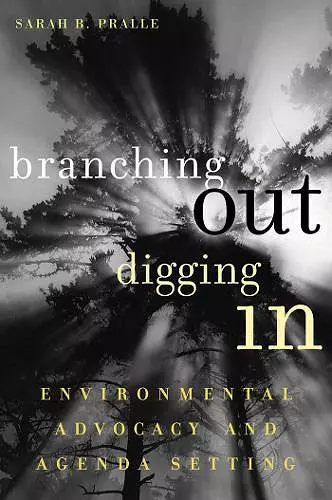Branching Out, Digging In
Environmental Advocacy and Agenda Setting
Format:Paperback
Publisher:Georgetown University Press
Published:22nd Dec '06
Currently unavailable, and unfortunately no date known when it will be back

Pralle uses two fascinating, richly developed case studies to develop an insightful model of conflict management that is an important contribution to the study of group dynamics, agenda-setting, and environmental politics. -- George Hoberg, professor and head, department of forest resources management, University of British Columbia Through a careful comparison of two logging disputes in Canada and the United States, Pralle analyzes the strategies used by agenda expanders and containers. Who wins? To answer that question, she catalogues problem definition skills for each contender and provides the most thorough analysis yet of strategies associated with venue selection. -- Roger W. Cobb, Brown University A highly revealing cross national study of the divergent dynamics of seemingly similar issue conflicts. It provides a compelling demonstration of the contingent and contextually dependent character of conflict management and agenda setting. It is sure to be a welcome addition to the policymaking literature. -- Charles D. Elder, professor of political science, Wayne State University This is, by far, the best book to date on conflict expansion, venue-shopping, and the strategic competition among policy advocates over who makes public decisions and on what basis. The book demands attention not only from those interested in environmental policy, but more broadly from all those concerned with public policy, issue-definition, and venue-shopping at national and international levels. Not least, it should be read by policy advocates themselves for important lessons about how to contain or to restructure debates. The outcomes of important political controversies depend on it. -- Frank R. Baumgartner, Distinguished Professor of Political Science, The Pennsylvania State University
Looks at why some environmental conflicts expand to attract a lot of attention and participation, while others generate little interest or action. This title examines the expansion and containment of political conflict around forest policies in the United States and Canada.Sarah B. Pralle takes an in-depth look at why some environmental conflicts expand to attract a lot of attention and participation, while others generate little interest or action. "Branching Out, Digging In" examines the expansion and containment of political conflict around forest policies in the United States and Canada. Late in 1993 citizens from around the world mobilized on behalf of saving old-growth forests in Clayoquot Sound. Yet, at the same time only a very few took note of an even larger reserve of public land at risk in northern California. Both cases, the Clayoquot Sound controversy in British Columbia and the Quincy Library Group case in the Sierra Nevada mountains of northern California, centered around conflicts between environmentalists seeking to preserve old-growth forests and timber companies fighting to preserve their logging privileges. Both marked important episodes in the history of forest politics in their respective countries but with dramatically different results. The Clayoquot Sound controversy spawned the largest civil disobedience in Canadian history; international demonstrations in Japan, England, Germany, Austria, and the United States; and, the most significant changes in British Columbia's forest policy in decades. On the other hand, the California case, with four times as many acres at stake, became the poster child for the "collaborative conservation" approach, using stakeholder collaboration and negotiation to achieve a compromise that ultimately broke down and ended up in the courts. Pralle analyzes how the various political actors - local and national environmental organizations, local residents, timber companies, and different levels of government - defined the issues in both words and images, created and reconfigured alliances, and drew in different governmental institutions to attempt to achieve their goals. She develops a dynamic new model of conflict management by advocacy groups that puts a premium on nimble timing, flexibility, targeting, and tactics to gain the advantage and shows that how political actors go about exploiting these opportunities and overcoming constraints is a critical part of the policy process.
- Winner of Science, Technology and Environmental Politics Section: Lynton Keith Caldwell Prize.
- Winner of Science, Technology and Environmental Politics Section: Lynton Keith Caldwell Prize 6 (United States)
- Winner of Charles A. Levine Memorial Book Prize.
- Winner of Charles A. Levine Memorial Book Prize 6 (United States)
- Commended for Lynton Keith Caldwell Award 6 (United States)
ISBN: 9781589011236
Dimensions: unknown
Weight: 454g
296 pages